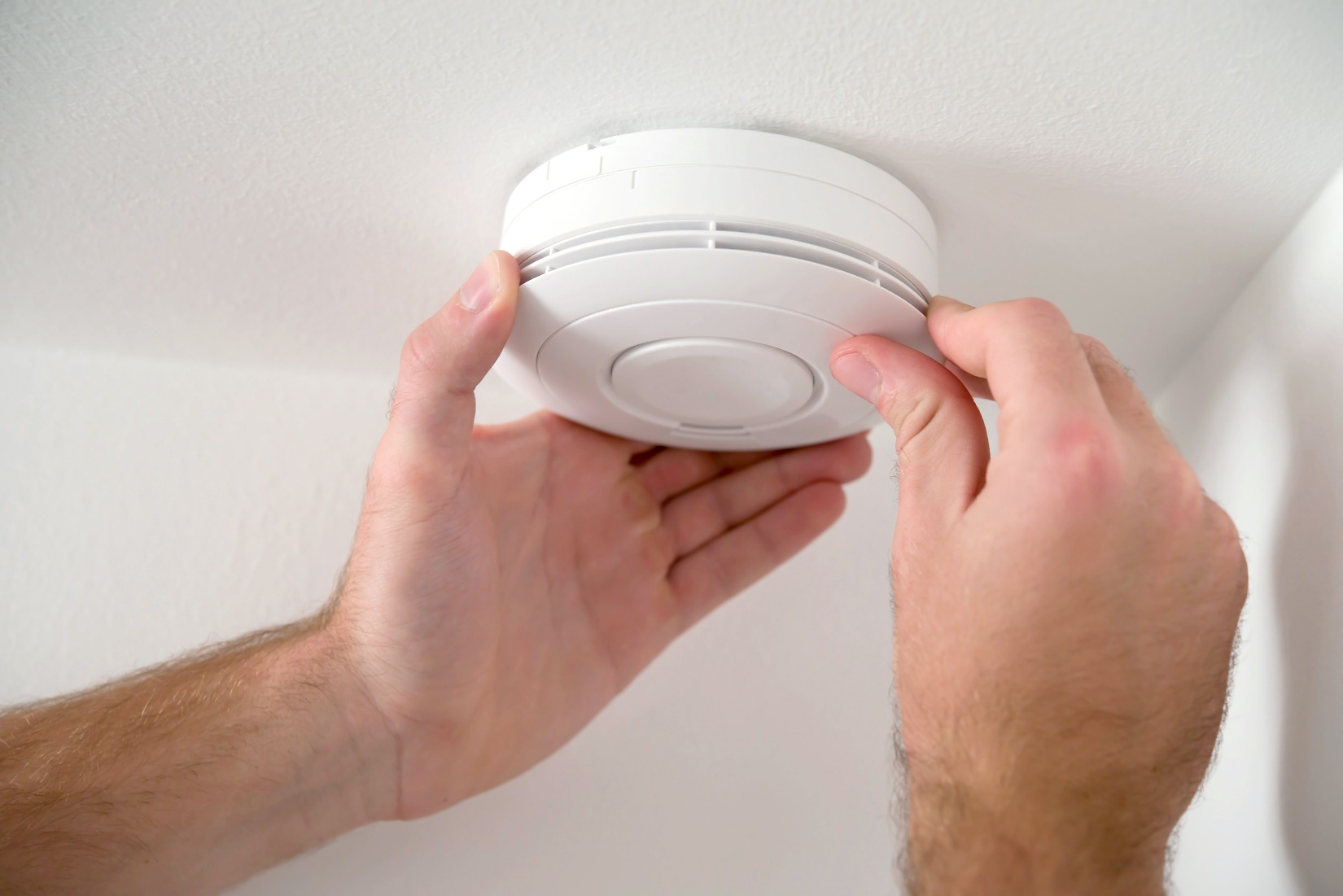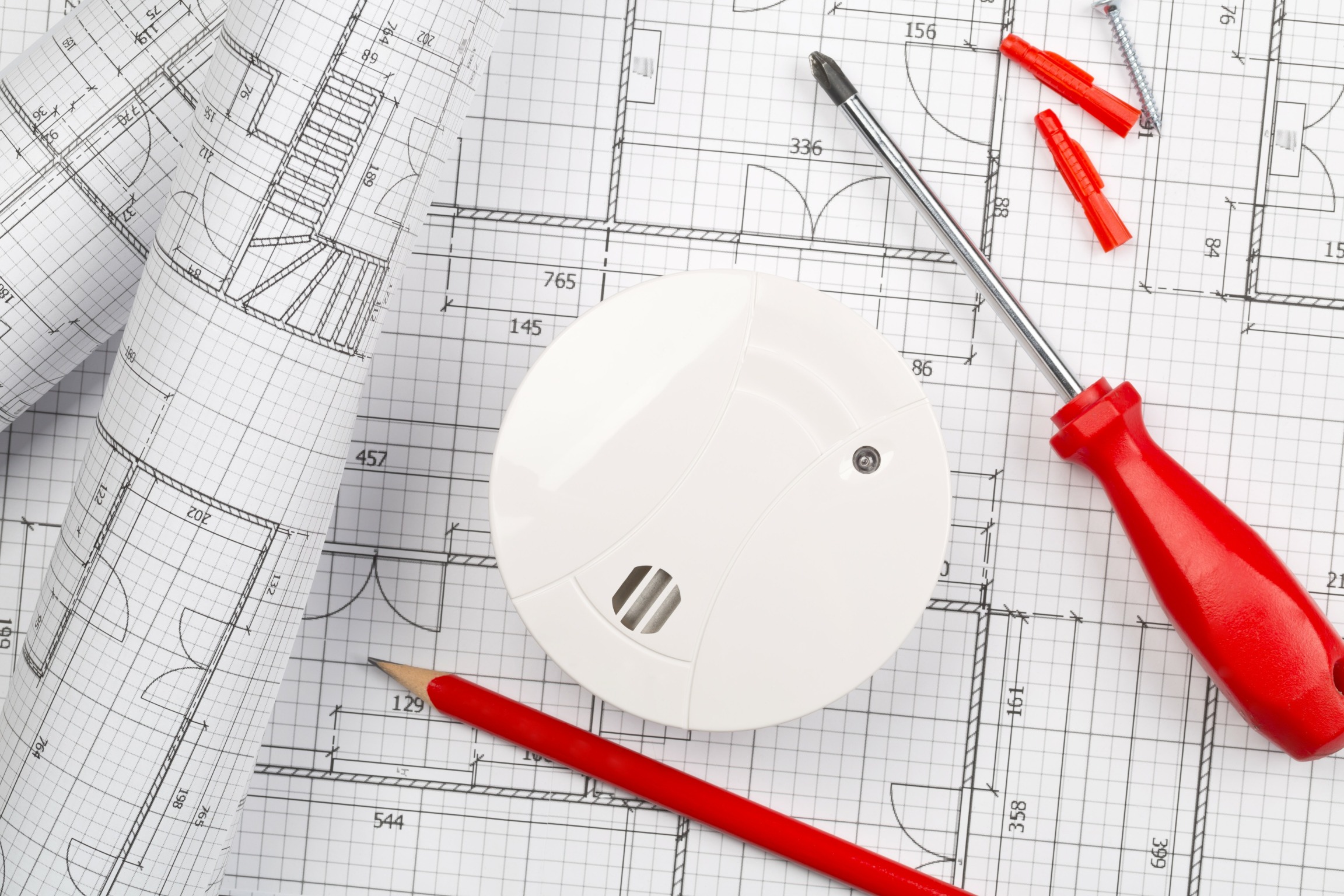How To Test Hardwired Smoke Detectors
Choosing a suitable smoke detector could spell the difference between life and death. Knowing the differences between the different smoke detector systems will help you choose the one that will protect your family the most if there is a fire in your home.
What Are Hardwired Smoke Detectors
When we say “hardwired” smoke detector, we mean a smoke alarm system hooked up to a 120-volt circuit. Hardwired smoke detectors are connected straight to your home’s electrical system. It is different from regular smoke detectors, which only use batteries for power. Hardwired smoke alarms are great for homes with more than one floor, apartment buildings, and commercial buildings. It is because when one alarm goes off, they all go off. But the fact that everything’s connected can also add an additional layer of security to homes that aren’t very big.
Because of this, a hardwired system is much more reliable. It will only stop working if the power and the battery fail simultaneously, which is very unlikely.
Hardwired smoke alarms can easily keep your home safe for ten years. It is the minimum time you can use an alarm before it needs to be replaced. Did you know that you must return your smoke alarms every ten years? Or sooner if the tests don’t show the answers, they should give.
Since testing a smoke alarm involves more than just checking the power supply, regular testing should help find smoke alarms that aren’t working. So, landlords and letting agents should continue to put the utmost importance on testing smoke detectors.
If you have a working smoke alarm, you are twice as likely to get out of a house fire.
Because of this, a power supply always on makes sure your smoke alarm will work.
Installing either type of smoke alarm is a good idea because having any smoke alarm that works is better than having none. Meanwhile, we can’t say enough about how important it is for your home to have hardwired smoke detectors. You’ll probably still have power even if there’s a fire in your house. On the other hand, you can only count on battery-powered smoke detectors for a bit longer than when you last replaced them.
Hardwiring is also helpful for people who regularly forget to check and replace the batteries in their smoke detectors or who can’t reach them to do this routine maintenance.
Do you hear your fire alarm going off? You should set up a time to check your smoke alarm right now.
Your smoke alarms should be checked regularly by someone who knows about electrical systems. They should look for signs of damage, wear, or failure to meet the latest safety standards.
There is a chance that plumbers and heating engineers need to be qualified to do these checks. If any dangers are missed, you and they could both be held responsible.
If you regularly check your smoke detector, you can be sure that no one in your family will be in danger without first being warned. This guide will show you the actions you need to take to test your fire safety equipment properly. It will also give you good installation tips to help your testing routines.
Methods for figuring out how well hardwired detectors work
If a fire begins in your house or place of business, a properly installed smoke detector is one of the few things that could save your life. The United States Fire Administration (USFA) says that most people who die in fires or from breathing smoke do so in homes without smoke detectors. Also, direct property losses add up to almost $11 billion a year. So, not having even the most basic smoke alarm can have significant effects. Unfortunately, some of us set it up but then forget about it until it (hopefully) alerts us to smoke. Or, if it runs on batteries, reminds us that the batteries are getting low and need to be changed. Since all states have rules to prevent fires, most people have at least one smoke detector in their homes.
The United States Fire Administration says you should press the Test button on your alarms at least once a month. Also, it would be best to get rid of any smoke detectors over ten years old or that don’t make a sound when you press the Test button (it indicates that it no longer functions). It is one of the most basic ways to tell if the devices are still working. But there are other, better ways to test your smoke detectors to ensure they will work as they should if a fire starts. This article can explain some of the most common ways to try something. But first, it’s essential to know the differences between the different types of sensors that are used in smoke detectors.
Types of Sensors Used in Smoke Detectors
1. Ionization sensor
It is a perfect way to quickly find small particles from burning fires. The technology behind it uses a small amount of radioactive material (usually Americium 241, a radioactive isotope of americium) and two plates that create an electric field to ionize the air inside a chamber. If small smoke particles enter the room and disrupt the flow of the ionized air, the sensor will go off.
2. Photoelectric sensor
This kind of sensor was made to quickly and accurately find the presence of bigger particles. It uses a light source, usually at a ninety-degree angle, and points away from the sensor. If smoke particles enter the chamber, they will scatter the light beam. It will cause the particles to hit the sensor and set off the alarm.
3. Dual-sensing sensors
Since fires can be very different, it’s hard to know which type of sensor would be best for a particular situation. So, combining photoelectric and ionization sensors is the best way to find any smoke inside the house quickly. It’s important to remember that you should also think about getting a carbon monoxide alarm with an electrochemical sensor to make sure your home is safer. Having a separate unit means that even if one detector stops working, there will still be at least one other that works.
Note: If your smoke detectors are connected to a central security alarm system, you need to call the company ahead so they don’t send firefighters to your home. If your smoke detectors are not connected to a central security alarm system, you do not need to call the company ahead of time.
A smoke detector that is hardwired into a home’s primary electrical system will do its job differently than one powered by batteries. But it still has batteries that can be used as a backup power source if there is a problem with the electricity. If you have this kind of smoke detector, you should check the batteries and all of the parts once a month to ensure a reliable first line of defense in case of a fire.

How to do a preliminary test to make sure hardwired smoke detectors work
If you want to know how to test your smoke detector and fire alarm the right way, you should always check the instructions that come with them. The USFA says, however, that you can use the following method to test most battery-powered and hardwired smoke detectors:
Step 1
First, you should tell your family that you will check the alarm. Smoke detectors have high-pitched alarms that could scare young children. Therefore, you should let everyone know that you plan to test the alarms so that no one gets scared. It will be useful.
Step 2
Put a family member in the part of the house that is the farthest from the alarm. It can be a significant way to ensure one can hear the alarm all over your home. It would be best to put more detectors where the notice is weak, hard to hear, or otherwise not very loud.
Step 3
Press then hold the test button of the smoke detector to turn it on. The smoke detector should sound a loud, piercing alarm when the button is pressed. The notice takes a few seconds to start, but it should keep going as long as the button is pressed. Change the batteries if the sound is tranquil or doesn’t come out. Whether your detector is battery-powered or hardwired, if it has been more than six months since you last changed the batteries, you should do so right away, no matter what the test says. After replacing the batteries, you should test them again to ensure they are working correctly. Even if the batteries are new, you should still look at your smoke detector to ensure that dust or anything else isn’t blocking its holes. Even if the batteries are new, this can make the device stop working.
The USFA says that a smoke detector will usually work for ten years. Keep these things in mind. Even if you have done regular maintenance on the device and it is still working, you should replace the smoke detector after ten years or earlier if the manufacturer’s instructions say you should.
Getting good test results means using the right strategies for buying and installing.
After buying new equipment, you need to take a few essential steps before you can test it in a way that is accurate and thorough. These are the ways to use fire-safety devices wired in or run on batteries.
Every smoke detector has a label that tells you about the different qualities and features of the device. Before you go out and get a new sensor, you should read all the labels carefully, but the testing label is the most important one. Before using this label, please ensure a reputable testing center has made it.
When you do a test with your family, the sound must travel far and wide. This is why you should put each new detector in an easy-to-reach place. The following areas are among the most important:
Install a sensor on the wall or ceiling near the bed in each bedroom.
Install a smoke alarm in every hallway, especially in those that lead to bedrooms or other places where people sleep.
For a smoke detector to work in the basement, you must place it on the ceiling near the bottom stair.
Installing your smoke alarm in the kitchen at least 10 feet away from any cooking appliances that make heat will help keep it from going off accidentally.
Accidental Triggers
Even if you have set up and tested your fire alarm, some things could make it go off accidentally. In any of these situations, you won’t need to buy a new piece of equipment. That is unless the one you already have broke. If you know what could accidentally set off a smoke detector, you won’t waste money replacing ones that don’t need to be replaced.
A typical smoke detector will go off and sound a false alarm when you burn food while cooking or when smoke from a fireplace is high in the air.
Steam is another unexpected thing that can set off the alarm. It usually happens in the kitchen or bathroom. The false alarm could go off if you make too much steam, like when you take a hot shower or boil water in a pot.
Things in the environment can also set off alarms by accident. Therefore, you should always clean the sensor well and eliminate all dust and debris. If you can open the device, clean the area around the opening often. It is because insects that get inside can also set off the alarm.
Installing smoke detectors in your home is one of the ideal things you can do to keep your family safe. However, assuming that can be dangerous for everyone. If you take a few minutes to check on them, you can ensure they are working correctly.
You now know how to test hardwired smoke detectors and how they can protect your family.
If you don’t already have one, think about buying one. Not only will a smoke detector make your home safer – it will also offer you more peace of mind there. Also, check with your insurance company to see if you can receive a discount on your homeowner’s insurance policy once the safety equipment is installed. Call Southwest Integrated Solutions if you have more questions about smoke detectors, fire alarms, or how these safety devices related to your homeowner’s insurance.



